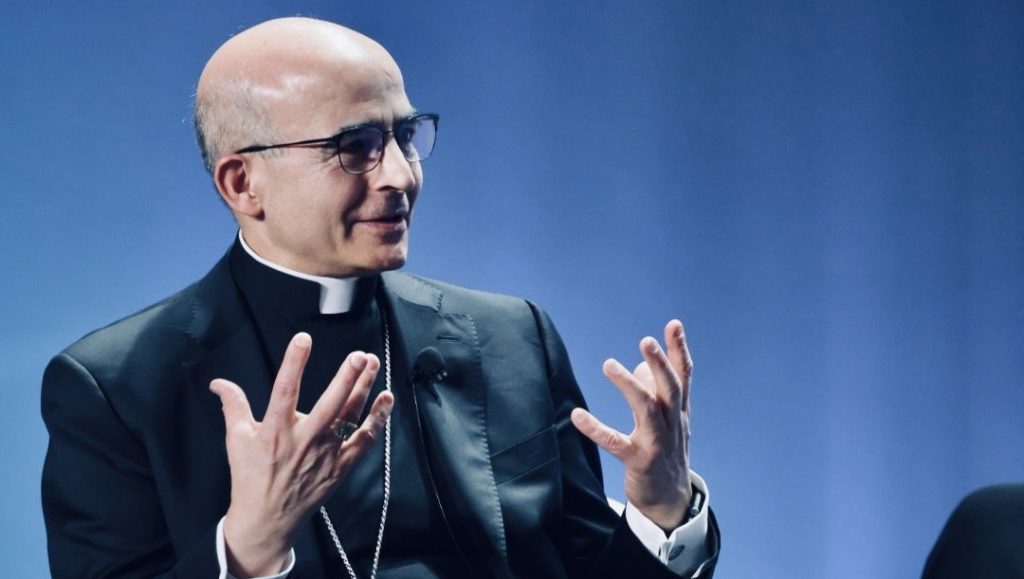In a letter to multiple U.S. Senators, the U.S. Bishops’ Conference Committee on International Justice and Peace chairman expressed his support for a resolution that recognizes religious freedom as a fundamental right and supports it as a cornerstone of U.S. foreign policy.
The resolution, S. Res. 569, was introduced in the Senate by Sen. Christopher Coons, a Democrat from Delaware, and Sen. James Lankford, a Republican from Oklahoma, on Feb. 29. It has been referred to the Senate Committee on Foreign Relations. It doesn’t have a date set for a vote.
“In tandem with the Holy Father’s strong affirmation of religious freedom, I wish to express my support of S. Res. 569 and commend you for introducing this measure,” said Bishop Elias Zaidan of the Maronite Eparchy of Our Lady of Lebanon, the USCCB International Justice and Peace chairman.
Zaidan addressed the letter, sent March 22, to Coons, Lankford, as well as the resolution’s cosponsors Sen. Tim Kaine, a Democrat from Virginia, and Sen. Thom Tillis, a Republican from North Carolina.
If the resolution is passed, the Senate would recognize religious freedom as a fundamental human right and recognize the critical importance of religious freedom in supporting democracy, encouraging pluralism and robust political participation, and fostering global stability and peace. The resolution would also have the Senate express concern over threats to religious freedom around the world and condemn all efforts to suppress religious freedom.
Further, the resolution would urge the U.S. Department of State to:
- Continue bilateral and multilateral engagement on religious freedom with allies and partners
- Maintain and expand support for human rights activists, journalists, and civil society leaders working to protect religious freedom in countries of particular concern and special watchlist countries
- Leverage all diplomatic sanctions and tools available to the U.S. government to hold religious freedom violators accountable for their actions
- Consider human rights abuses and religious freedom violations in prioritizing partners for free trade agreements
- Promote religious freedom as an utmost priority for the United States in implementation of United States foreign policy
“I certainly support the resolution’s urging the Department of State to continue bilateral engagement with allies on religious freedom as well as to impose sanctions to hold violators or religious freedom accountable while expanding support for human rights activists,” Zaidan said.
The resolution also highlights that, according to the United States Commission on International Religious Freedom (USCIRF), in 2023 worldwide religious freedom violations by countries led to the death of nine people while in custody, the ongoing imprisonment of 1,311 people, the imprisonment of 1,491 other people, and the targeting of 2,228 people across 27 countries and entities.
Zaidan’s letter follows two others he sent to the Senate and House at the end of February urging them to reauthorize USCIRF, which is the government body charged with making policy recommendations to the president, Secretary of State and Congress related to religious freedom violations. The commission, created by the International Religious Freedom Act of 1998.
USCIRF’s current authorization is set to expire on Sept. 30. Zaidan’s letters were in support of the United States Commission on International Religious Freedom Act of 2024, S. 3764, which was introduced by Sen. Marco Rubio, a Republican of Florida, and subsequently referred to the Senate Committee on Foreign Relations. The bill would reauthorize the commission through Fiscal Year 2026.
In Zaidan’s February letters, he highlights the importance of USCIRF’s reauthorization so it can “continue to highlight the need to protect those who are discriminated against, harassed, and even killed for their faith.” He again referenced USCIRF’s importance in his March 22 letter.
“I recently sent letters to both the Senate and the House calling for the reauthorization of the U.S. Commission on International Religious Freedom (USCIRF),” Zaidan said. “It is my hope that S. Res. 569 will complement and buttress the work of USCIRF.”
“I greatly appreciate that S. Res. 569 shines a spotlight on the need to protect this vital human right, religious freedom, for all and would be happy to work with you to advance this legislation,” Zaidan said.

